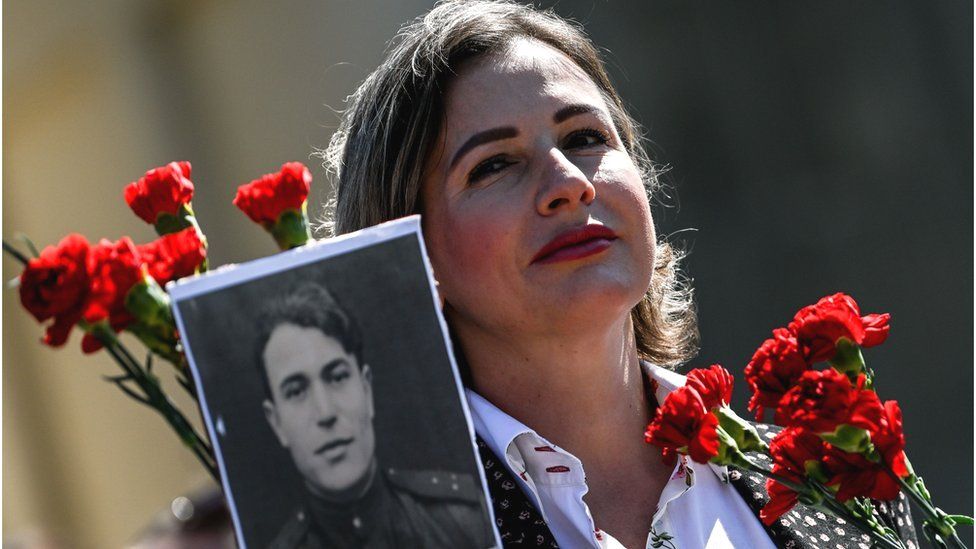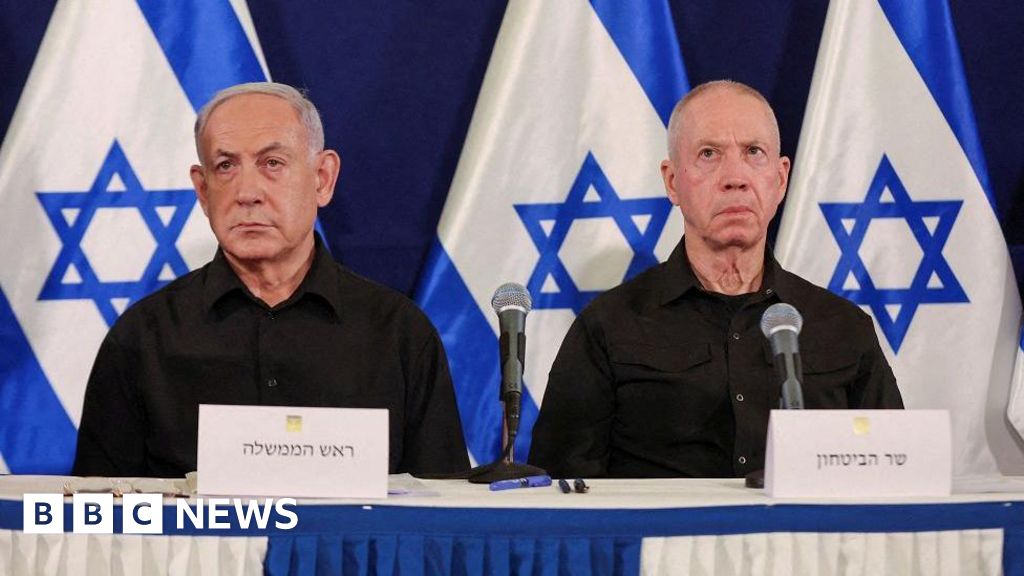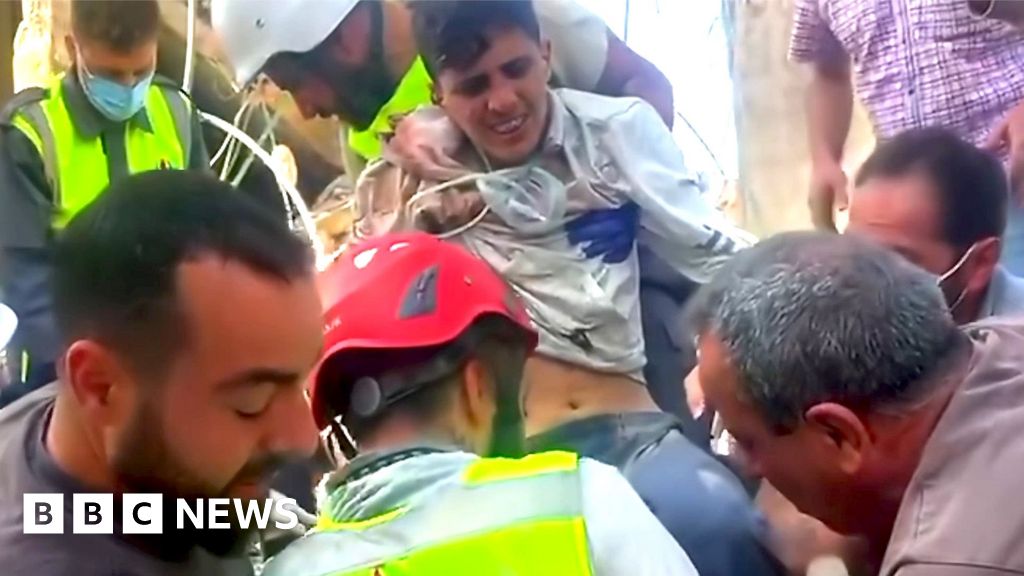ARTICLE AD BOX
 Image source, EPA
Image source, EPA
Victory Day commemorations in Berlin saw many turn out in the German capital with differing views
By Vitaly Shevchenko
BBC Monitoring, Berlin
Russian communities across Europe have been polarised by the Ukraine war - and that threatened to spill over in Berlin this month when they marked the defeat of Nazi Germany.
Given how much Vladimir Putin uses the Soviet victory over fascism in 1945 to justify Russia's ongoing full-scale invasion of Ukraine, there was no avoiding the war here in the German capital.
Many German-based Russians clearly believe the president's reasons for the war, with some views in Berlin virtually indistinguishable from the narratives promoted by Russian state TV - but others are just as vocal in opposing it.
The commemorations in Berlin started on 8 May, as Germany marked the 78th anniversary of its liberation from fascism, and groups of Russians visited the Soviet war memorial in Treptower Park.
One, Alexander, who is originally from Russia but has lived in Germany for more than 20 years, said he believed Russian forces were "defending Donbas, Crimea, Kherson, and Odesa against fascists" - listing places in south-eastern Ukraine.
Alexander shows personal items decorated with portraits of Putin, he says he believes Russia is fighting fascism in Ukraine
"They belong to Russia! Russia is taking back what belongs to it," added Anna, another Russian living in Germany.
Alexander then showed me a cigarette holder and a tobacco box he had decorated by taping portraits of President Putin to them.
But the events that matter most to Russian speakers were held the following day, 9 May - marked in Russia as Victory Day.
They kicked off with the Russian ambassador laying flowers to the imposing statue of a Soviet soldier in Treptower Park. Again, the event mostly attracted supporters of the Kremlin's policies and rhetoric.
One of them, a young Russian called Yevgenia, told me that "the collective West, particularly America" were fanning the flames of neo-Nazism in Ukraine.
Yevgenia was sporting the St George's Ribbon - a Kremlin-backed symbol often used by Russian troops fighting in Ukraine. Like many at the rally, she and her friend held aloft a Soviet flag, as Russian flags were banned.
Yevgenia (right) wears a St George's Ribbon - a Kremlin-backed symbol used by Russian troops in the Ukraine war
But not everyone supported such views.
The monument to the grieving mother at the other end of Treptower Park was the meeting point for those who wanted to honour the victims of fascism without supporting Mr Putin's claims that he is fighting "fascists" in Ukraine.
And many of the people who gathered there were Russians. One of them, Kirill, told me he fled Russia last October to avoid being drafted into the army and being sent to fight in Ukraine.
"I do not want to become a murderer for Putin. I do not believe the lies I'm told by TV," he said.
"I was very afraid, but I attended anti-war rallies. I did all I could do," Kirill told me, standing alongside a poster about political prisoners in Russia.
Kirill, with a poster of political prisoners in Russia, says he left the country to avoid being drafted into the Russian army
Kirill fled Russia after being arrested, fined and beaten for attending anti-war rallies in St Petersburg.
Another young Russian in this corner of Treptower Park, an activist called Alexandra, thought President Putin had turned Victory Day into a propaganda tool. "It is an absolute sacrilege for us," she told me.
Her friend Ekaterina chimed in: "It is important for me to show that not everyone from Russia supports what is happening in Ukraine or what this day has turned into.
"The way it is marked now is a one big reason why this war started on 24 February last year."
At another important event held by Russians in Berlin on Victory Day, dozens gathered at the Brandenburg Gate for what is known as the march of the Immortal Regiment.
Even though such marches are encouraged by the Kremlin, the one held in Berlin seemed less overly political than the events in Treptower Park, with dozens of Russians solemnly carrying photographs of their ancestors who fought in World War Two.
A group of anti-war Russians demonstrated against Victory Day being turned into a propaganda tool - but their event was outnumbered by the rally sporting Kremlin-encouraged symbols such as St George's ribbons or Soviet flags.
Kristina attends a demonstration with a sign criticising the West's supply of weapons to Ukraine
But what do Germans think of all this?
I was able to find the whole spectrum of opinions among them. Many came to Treptower Park on 8-9 May to offer thanks for the Soviet army liberating Germany from fascism, and were less concerned with the present.
"What Putin is doing in Ukraine now doesn't change the fact that [Russia did liberate Germany]," one of them, Wolfgang, told me.
Another German demonstrator, Kristina, was against weapons deliveries to what she described as the "fascist regime" in Ukraine.
But a young man, Janek, said it was "shameful" that President Putin was using the defeat of Nazism as a foreign policy tool.
"They say they want to free Ukrainians from the Nazis there - but it's just not true, it's propaganda," he said.

 1 year ago
65
1 year ago
65








 English (US)
English (US)